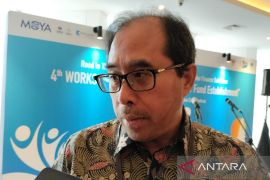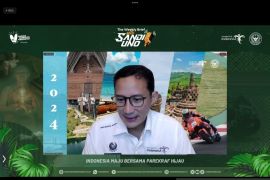"Absolutely satisfied with all of Papua`s culture in Wamena," Smith Jr, an Australian tourist, said.Jakarta (ANTARA News) - Warriors of the Dani, Lani, and Yali tribes in Baliem Valley, Jayawijaya, Papua, usually engage in a mock war to enliven the Baliem Valley Cultural Festival that celebrates fertility and welfare of the tribal people.
For the Dani tribe, a tribal war symbolizes maturity and power. Nowadays, these battles have also become a tourist attraction, drawing visitors to the Dani villages, particularly during the Baliem Valley Festival that has been organized annually since 1989.
This year, the festival is being held on August 8-10 in Wamena, Walesi Sub-district, Jayawijaya District, Papua. Wamena is also known as a "cold town" as the temperature in the area drops to as low as eight to 10 degrees Celsius in the evening.
The Baliem Valley is located in the central mountains of Papua. The valley, once dubbed as "Shangrila," is incredibly lush and fertile and is surrounded on all sides by towering peaks measuring 2.5 thousand to three thousand meters in height.
The grand valley is 72 kilometers (km) long and 16-31 km wide and is inhabited by the Dani Tribes, the Neolithic warriors and farmers, and other sub-tribes of Yali and Lani, with their complex and primitive cultures, which bear striking resemblance to the "stone age" cultures.
Farming activities have been carried out in the valley for nine thousand years, but it was only discovered by westerners in 1938, according to information on the www.papua-adventure.com website.
The Dani tribal members live in the main valley, the Lani to the west, and the Yali in the south-east. Each tribe has a distinct culture.
A sure and interesting way to distinguish between the tribes is from the Koteka, or penis gourd, sported by the male members. The men of each tribe tend to the growing of the gourds, with the three tribes each cultivating a different style. The Dani use a long, thin Koteka; the Lani sport a medium-sized, wide cannon-like gourd; and the Yali wear the longest of all, the online information continued.
The festival offers a unique ambience. By attending the massive Baliem Valley Festival, visitors will have the rare opportunity to learn and experience firsthand the different traditions of each tribe.
Currently, some 200 foreign tourists are attending the 27th Baliem Valley Cultural Festival. Over 300 dancers will perform during the festival.
The unique traditional culture and natural scenery of Baliem Valley surrounded by mountainous area are major tourist attractions, Head of the Jayawijaya tourism office Alpius Wetipo stated.
"Hence, this annual event organized by the Jayawijaya district administration is always able to attract hundreds of foreign tourists," he pointed out.
During the festival, the tourists are being entertained with traditional dances and cultural attractions and taken on guided tours to several tourist destinations.
Some other tourist attractions of Jayawijaya include the white sand beaches, an ancient mummy of a tribal chief, Lake Habema, salt springs and a canopy.
"Absolutely satisfied with all of Papuas culture in Wamena," Smith Jr, an Australian tourist, informed Antara.
On the previous night, the Jayawijaya administration had hosted a welcome dinner for seven foreign ambassadors and diplomats, who are in Wamena to attend the festival.
The VIP guests include Italian Ambassador to Indonesia Vittorio Sandalli, Ambassador of Switzerland to Indonesia Yvonne Baumann, Armenian diplomat Vardan Sargsyan, Hungarian Ambassador to Indonesia Judit Nemeth Pach, Bulgarian Ambassador to Indonesia Sergey Michev, Mexican Ambassador to Indonesia Federico Salas, and Indian diplomat Rohit Babbar.
Ambassador Sandalli expressed happiness on being invited to attend the festival. Sandalli said he had gained knowledge of Indonesias cultural plurality from the festival.
"This festival is very important, so we feel honored on being invited to witness Papuas culture in Indonesia," he informed Antara on August 8.
Deputy District Head of Jayawijaya Jhon Richard Banua hoped that Papua will leave a good impression on the foreign diplomats during their visit to Wamena.
The implementation of the festival costs Rp9 billion, he remarked, adding that the local government had also spent additionally for infrastructure and supporting facilities for the event.
Some 250 security personnel comprising military and police officers are deployed to secure the festival.
The personnel have been stationed to protect the festivals venue, hotels, and routes to be taken by foreign visitors to reach certain tourist destinations.
After attending the festival, visitors can go on a sightseeing tour to the Dani Market in Wamena and visit the traditional Wauma Village that can be reached by car from Wamena.
In Aikima, there is a famous 250-year-old mummified village chief. Moreover, after a two-hour trek, visitors can reach the salt springs, where the Dani women have, for centuries, made salt using a simple method.(*)
Reporter: Fardah
Editor: Heru Purwanto
Copyright © ANTARA 2016










